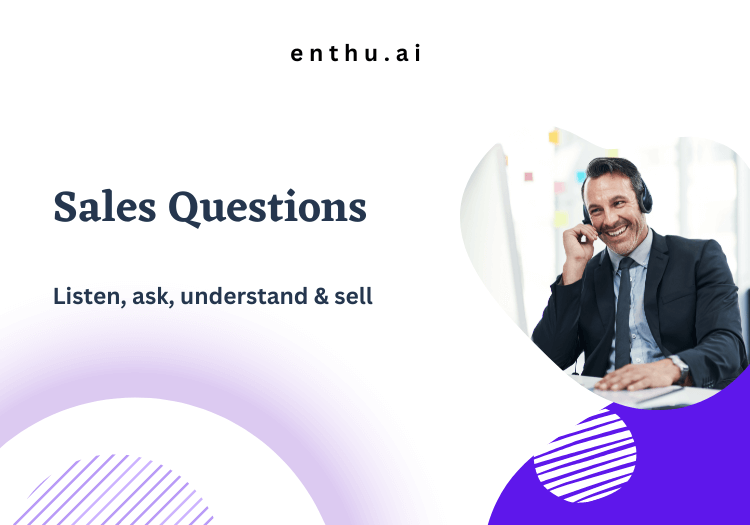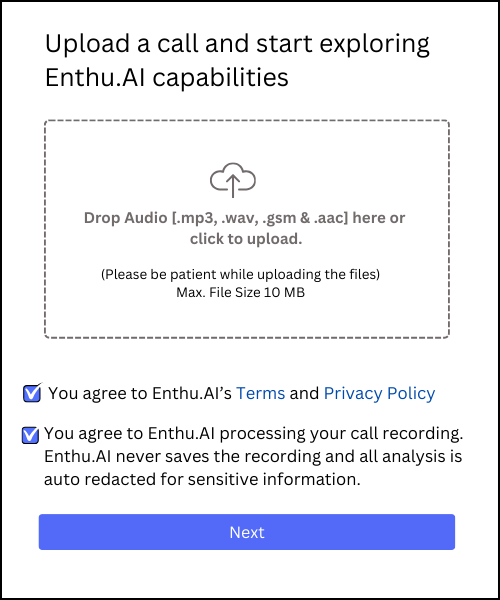Every sales rep must ask open-ended sales questions to the prospects because it will help you understand the prospect and his needs better.
These sales questions will force prospects to speak up about their needs and pain points that will help sales reps to present the solution which prospects cannot say no to.
Also, these questions build rapport and engagement between a rep and a prospect.
Below are 42 open-ended sales questions that sales reps should ask to their prospects and customers.
In this guide, you’ll find:
- Important questions for successful sales
- Sales question examples
42 Best sales questions to ask customers
A. Needs analysis questions

1. What does this product mean to you or your company?
A sales rep might ask a customer, “What does this product mean to you or your company?” to gain insight into the value and importance the customer places on the product. The customer’s response informs the sales rep’s approach and message to better align with the customer’s needs and goals.
For example, if the customer is concerned about improving their company’s productivity, the sales rep can focus on the features of the product that will help them achieve that goal.
2. Which product are you using now and why are you using it?
Asking about the customer’s current product usage and their reasons for it is a way for a sales rep to understand the customer’s needs and preferences.
For example, a sales rep for a software company might ask a potential customer which project management tool they are currently using and why, in order to better understand their needs and position their own product as a superior alternative.
3. What’s preventing you from reaching your goals?
Asking what’s preventing someone from reaching their goals is a common sales tactic used to identify a potential customer’s pain points or obstacles.
For example, a sales rep for a weight loss program might ask what’s preventing the customer from losing weight, such as lack of time, motivation, or access to healthy food options. This allows the sales rep to tailor their pitch to address the specific concerns and needs of the customer.
4. What are some problems that you are looking to solve?
Asking what problems a customer is looking to solve helps a sales rep understand the customer needs.
For example, a sales rep for a software company can ask what problems the customer is experiencing with their current system, such as slow performance or lack of integration with other tools.
This allows the sales rep to pitch their software as a solution to these specific problems.
5. What do you think about our offer?
Asking a customer for their thoughts on an offer is a common sales tactic used to gauge interest and gather feedback.
For example, a sales rep for a car dealership might ask a customer what they think about the offer on a specific vehicle, such as a discount or financing option.
This allows the sales rep to adjust their offer based on the customer’s feedback and increase the chances of making a sale.
Read more about: Call center software
B. Qualifying questions

1. What is your budget?
Asking a customer about their budget determines their affordability for a subscription.
For example, a sales rep for a project management software might ask a potential customer what their budget is for such a tool, to offer a suitable pricing plan. This allows the sales rep to recommend plans that are within the customer’s budget and help in converting them into a paying customer. This open ended question increases customer engagement and ensures customer success. For example, a sales rep for a CRM software might ask a customer what they think the next steps should be to onboard the tool within their organization. This allows the sales rep to understand the customer’s needs and offer personalized assistance, ensuring customer satisfaction and customer retention. This question identifies the customer’s issues and challenges. For example, a sales rep for a real estate agency can ask a potential buyer what their top concerns are, such as location, price, or size of the property. This allows the sales rep to tailor their offerings to match the customer’s needs and increase the chances of a successful sale. Asking a customer to prioritize price, quality, and service is a sales tactic to determine their buying behavior and preferences. For example, a sales rep for a cloud storage software might ask a potential customer to prioritize between price, quality, and service when considering a storage solution. This allows the sales rep to position their software accordingly and offer the benefits that the customer values the most, increasing the chances of a successful sale. A sales rep can ask what service level they are comfortable paying for, such as basic, premium, or enterprise. This allows the sales rep to recommend a suitable pricing plan that matches the customer’s budget and service expectations, increasing the chances of a successful sale while also working towards meeting their sales quota.. Read more about: quality monitoring software Asking a customer about their opinion on a product gathers feedback and gauge interest. For example, a sales rep for a skincare company can ask a customer what they think about a particular product they have tried, such as a moisturizer or serum. This allows the sales rep to address any concerns the customer may have and improve the product based on their feedback. A sales rep for a marketing agency can ask a client why they didn’t choose their services earlier, and learn that it was due to price or lack of understanding of the value offered. Asking a customer about their budget is a common objection handling tactic used to determine the feasibility of a sale and offer appropriate pricing options. For example, a sales rep for a web development company can ask a client about their budget for a new website project. This allows the sales rep to offer customized solutions that match the customer’s budget, increasing the chances of a successful sale. A sales rep can ask a potential customer if they have any other questions or concerns they would like to discuss before finalizing a purchase decision. This allows the sales rep to address any remaining issues and increase the likelihood of a successful sale. This sales question expands the conversation and identifies additional opportunities. For example, a sales rep for a consulting firm can ask a client about other areas they would like to explore beyond the initial project scope. Read more about speech analytics software Asking a customer about their past purchase experience helps in understanding their buying habits and preferences. For example, a sales rep for a furniture company can ask about their past experiences with purchasing furniture, including what factors influenced their decisions and what they liked or disliked about their previous purchases. Asking a customer about their previous purchases of a certain product is a sales tactic used to gauge their interest and familiarity with the product category. For example, asking a customer when they last purchased a laptop, to determine how up-to-date their technology is and whether they may be interested in upgrading. This sales question addresses problems with their current solution and challenges. For example, asking a customer what measures they have taken to fix any issues with their current software, to determine if their product can offer a better solution. Understanding the customer’s current pain points and identifying potential solutions is important while doing sales. For example, a customer may have experienced technical difficulties with a software product and reached out to the vendor’s support team for assistance. Alternatively, they may have implemented a workaround to mitigate the issue. Asking a customer if they have made a previous purchase with the company and what product/service they have bought is a sales tactic used to understand the customer’s past experience and potentially offer complementary or new products/services. Read more about: call transcription software A sales rep for a productivity tool can ask a customer what is holding them back from achieving their productivity goals, to provide features that address those specific issues. This allows the sales rep to position their product as a solution to the customer’s pain points and increase the likelihood of a completing the sales cycle. A sales rep might ask a customer about their most important projects to understand their business priorities and provide solutions that align with those priorities. A sales rep for a customer service software can ask a customer about their biggest customer service challenges, such as long wait times or lack of agent availability. This question seeks to understand why the customer’s current solution or process is not meeting their needs. For example, a customer may have outgrown a particular software product and require a more advanced solution. Alternatively, they may be experiencing usability issues with a current process that is hindering productivity. This sales question helps the sales rep understand the customer’s priorities. For example, a sales rep can ask, “What are your short-term and long-term goals for your business, and how can our solution help you achieve them?” This question is aimed at understanding their current sales process and identifying any pain points they may have with lead follow-up. This sales question demonstrates empathy and a willingness to understand the bigger picture of their business, which can strengthen the relationship between the customer and the sales rep. Asking this question to a customer provides insight into their level of competition and industry trends. For example, “If you could implement these changes, how would it affect your ability to compete with other companies in your industry?” If the challenge is related to customer support, the sales rep can highlight how their product’s advanced features can improve the customer experience and impress the board. Asking a customer, “If you could solve these problems, how would it impact you personally?” can help a sales rep understand the personal motivations and incentives of the customer. Read more about : customer churn This question aims to understand the current situation and recent developments in the customer’s business. Asking what motivated the customer to take the call can help a sales rep understand the customer’s interests and expectations. For example, “Thank you for taking this call today. Before we begin, may I ask what motivated you to speak with us?” This sales question allows the sales rep to understand the customer’s needs and concerns that have not been addressed in the conversation so far. A customer may be hesitant to switch to a new software solution because of the potential downtime and learning curve involved in the transition. By asking this question, you can address their concerns and provide solutions that address their specific needs. This is a question commonly asked by sales reps to understand the specific needs and expectations of their customers during an appointment. An example of this would be, “What do you hope to accomplish in today’s appointment? Are there any specific properties or features you are looking for?” to ensure that the appointment is productive. Read more about : sales call opening This sales question helps the sales rep understand the customer’s goals and how the product/service could help achieve them. For example, “What do you hope to achieve in the next year by implementing our project management software?” As a sales rep beat new or old, asking a customer “If you were to describe your situation in three years, what would you want to be different than what you have today?” helps understand their long-term goals. For instance, if selling software, a customer may say they hope to have increased their customer base, and the software should be capable of handling more transactions, thus improving efficiency. This sales questions help in understanding the customer’s perception of the benefits of working together and determine whether their solution aligns with the customer’s expectations. For example, “If we were to move forward together, how do you see our solution improving your team’s productivity?” This helps the customer think about the benefits of your product and how it can make their work easier or more efficient. This question helps the sales rep understand the customer’s problem with their current provider. For example, if a customer complains about slow response times, the sales rep might highlight their company’s fast and responsive customer service as a key differentiator. Read more about: Average handle time
Good selling questions are open-ended, thought-provoking, and focused on the customer's needs and desires. They encourage conversation and help the salesperson understand how they can best serve the customer.
The four types of selling questions are open-ended questions, closed-ended questions, probing questions, and leading questions. Each type serves a specific purpose in the sales process.
Hard sale questions are aggressive and pushy questions used to pressure a customer into making a purchase. They can make the customer feel uncomfortable and are generally not recommended for building long-term customer relationships. If you goal is to close more deals then you need to ask these questions to your prospects. Also, these questions to ask prospects in sales are important for your success because it helps you to connect and, understand their needs and pain points and provide them with a solution that can help them to overcome the problems they are facing. So, the importance of asking right sales questions cannot be understated.2. What do you think our next steps should be?
3. What are your top concerns?
4. If you had to, what would you emphasize regarding price, quality, and service?
5. What service level are you willing and comfortable paying for?
C. Objection based questions

1. What do you think about our product till now?
2. Can you tell me why you didn’t choose us earlier?
3. What budget do you have allocated for something like this?
4. What else would you like to talk about?
5. What other areas would you like to discuss moving forward?
D. Buyer history questions

1. What has your past purchase experience been with previous products/services?
2. When was the last time you bought a (product type)?
3. Are you satisfied with the service of your current provider?
4. What measures have you taken to fix your problems – if any – with your current solution?
5. Have you purchased anything from us before? If yes, what?
E. Finding their pain-point questions

1. What’s holding you back from meeting your goals?
2. What are the most important projects that you’re working on right now?
3. What are some challenges you’re looking to solve?
4. Why isn’t your particular solution and/or process working for you?
5. What goals do you hope to accomplish in the short-term and long-term?
F. Benefit-driven questions

1. How much time do you spend in follow-up with leads?
2. If this problem remains unsolved, how will it affect business in the future?
3. If you could implement these changes, how would it affect your competitiveness in the market?
4. How would your board of directors react if you could overcome this challenge?
5. If you could solve these problems, how would it impact you personally? What would it mean to overcome this challenge at a personal level?
G. Rapport building questions

1. What’s going on in your business these days? How have things changed?
2. What motivated you to take this call with me?
3. What have I not covered that you would like to know more about?
4. What concerns do you have about making changes in this area?
5. At this appointment, what needs to happen to make it worth your time today?
H. New reality questions
 1. What would you want to achieve in the next year by making this change?
1. What would you want to achieve in the next year by making this change?2. If you were to describe your situation in three years, what would you want to be different than what you have today?
3. Given all we’ve talked about, what do you see as being different if we were to move forward together?
4. How do you think changing this area could improve your day-to-day work?
5. You mentioned you’re not having a great experience with your current provider. If you work with us, what are you hoping will be different?
I. Product related questions

FAQs
What are good selling questions?
What are the 4 types of selling questions?
What are hard sale questions?
Conclusion












